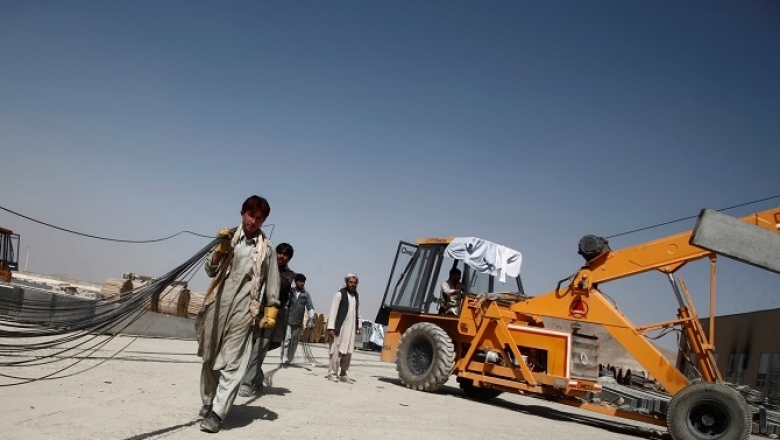Achieving the Sustainable Development Goals to end extreme poverty by 2030 will require about $4.5 trillion annually, far more than multilateral development banks or donors can provide by themselves. To face this challenge, the World Bank Group adopted the Maximizing Finance for Development (MFD) approach, which entails working with governments to crowd in the private sector while optimizing the use of scarce public resources. This approach is guided by the Hamburg Principles adopted by the G20 in 2017 and builds on the substantial experience across the institution.
A leading private conglomerate local to Afghanistan, the Ghazanfar Group, plans to build and operate a new 50 megawatts (MW) gasfired independent power plant near the city of Mazar (Mazar IPP) to help address the chronic electricity shortage in Afghanistan. To support this landmark project, expected to be completed in 2020, the World Bank Group collaborated early on to develop the structure of the transaction, project documentation, and instruments to enhance credit.
Development Challenge
After three decades of conflict, Afghanistan’s power sector is slowly recovering, but more than 70 percent of the population does not have access to the grid. Even those connected to the grid suffer from frequent power blackouts of up to 9–15 hours a day in some areas, which impacts residential and commercial users and severely limits development across all sectors of the economy. The Afghan government wants to move away from its heavy reliance on imported power, which accounts for 78 percent of their supply, and develop its own natural gas resources. However, it needs technical and financial support to do so.
The MFD Approach
Beginning in 2015, IFC has worked closely with the government and the Ghazanfar Group on legal, financial, and technical issues leading to bankable project documentation. They also helped stakeholders understand what is necessary to build a balanced, bankable framework. IFC and the World Bank are collaborating to catalyze the private sector investment through the envisaged IDA guarantee. IFC is acting as the lead arranger, working to provide debt financing for its own account and mobilize debt financing from other development finance institutions.
The Private Sector Solution
The Mazar IPP project involves the development, operation and maintenance of a 50 MW gas-fired power plant located near the city of Mazar-e-Sharif in the northwestern region of Afghanistan. The Mazar IPP project will be the first IPP in the country with the aim to create a template for future IPPs in Afghanistan and demonstrate successful private investment in the country’s power sector. The project is expected to optimize the use of the existing gas supply and electricity distribution infrastructure. The entire output of power will be sold to Da Afghanistan Breshna Sherkat (DABS).
Since 2015, IFC has been working with the Ghazanfar Group and its legal and technical advisers on development of the project and has had extensive negotiations with all government stakeholders. Project agreements, including for implementation, power purchase, and gas sales, were signed by the relevant ministries and the Ghazanfar Group in early 2018. The total project cost is estimated at $75 million, and IFC is considering providing debt financing.
IFC’s support went beyond providing upstream structuring assistance by sharing industry expertise and advice. Their comprehensive guidance ranged from bankable risk allocations, lenders’ bankability requirements, appointing the project team and consultants, and brokering negotiations with stakeholders.
Working closely with IFC, the World Bank has provided advice to the government, including on regulatory matters and gas supply issues. The Bank is also expected to provide an IDA payment guarantee to backstop payment obligation to the IPP from the Afghan power utility DABS. Through a combination of the guarantee and other grant financing for the sector, the World Bank will provide strong and longterm reassurance to the sponsor for their investment in the project and help the project reach financial close.
Creating Markets
The proposed investment, advisory interventions, and guarantees, will support the government’s strategy to open the IPP market in Afghanistan. Unlike a typical investment project, IFC has been working on upstream structuring of this transaction to support the development of bankable project agreements. The agreements will not only support this initial IPP, but become the foundation of future IPPs in Afghanistan.
Making a Difference
The Mazar IPP project is expected to have a long-term impact beyond the scope of just one power plant. Once operational (scheduled for 2020), the plant is expected to supply electricity to about 1 million people, boosting the country’s domestic power supply by up to 30 percent. The most significant expected project-level impacts are to:
• Increase the supply of domestic power generation capacity, resulting in a decrease in load-shedding and an improvement in quality of life—for households as well as industrial and commercial customers.
• Enhance energy security by reducing reliance on other countries for electricity imports.
• Increase private sector participation in the energy sector, encouraging other potential investors to enter this untapped market.
• Demonstrate the viability of an appropriately structured transaction, with potential to unlock additional IPPs to help close Afghanistan’s energy deficit.


